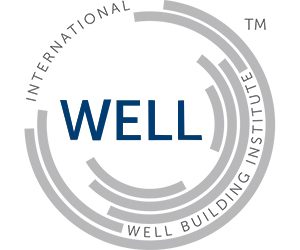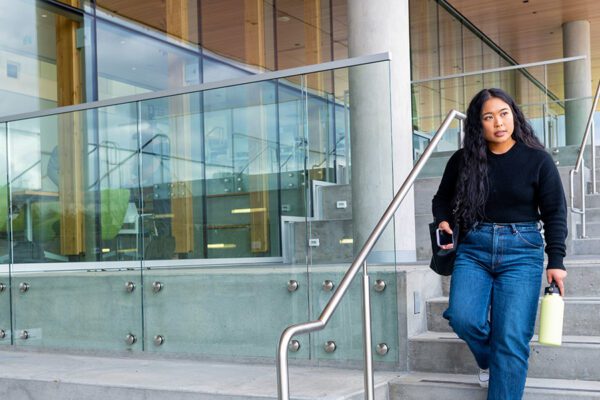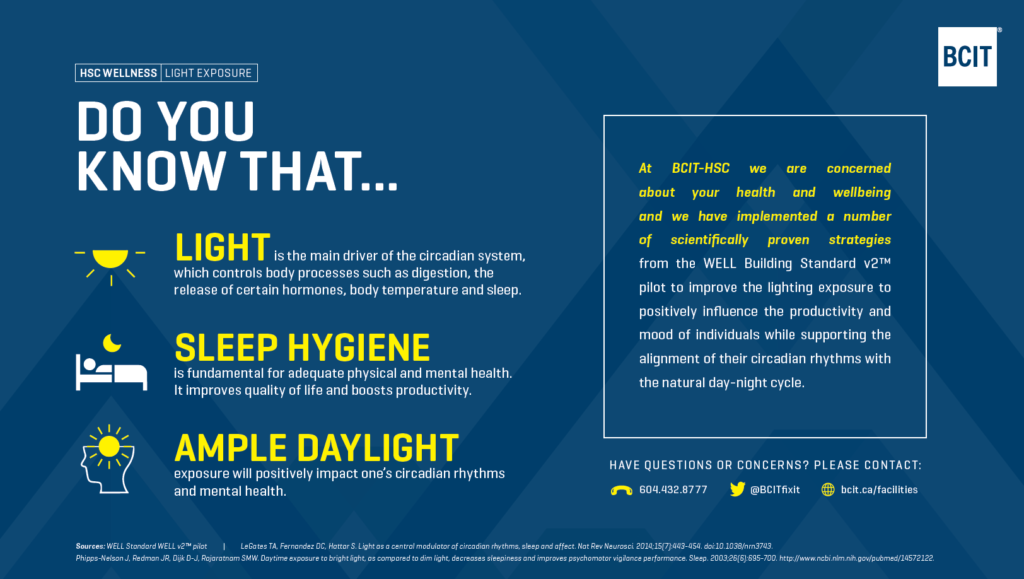Quality education starts with an engaging learning experience. The buildings we learn and work in can directly affect our level of engagement by their design. Our commitment to being a people-focused institution that delivers an applied education starts with ensuring the spaces our students learn in and our instructors teach in consider all aspects of human experience, health, and well-being.
Health Sciences Centre
WELL is the leading tool for advancing building design that prioritizes the health and well-being of building occupants. BCIT has been working to towards WELL Gold Certification since the early planning of the new Health Sciences Centre located on our Burnaby campus. With an innovative design focused on experiential learning, the building’s WELL certification will ensure occupants are supported through the integration of 10 design considerations:



Well Design Considerations

Air

Water

Nourishment

Light

Movement

Thermal Comfort

Sound

Materials

Mind

Community
Understand the WELL Concepts
 Air
Air
The WELL Air concept aims to ensure high levels of indoor air quality across a building’s lifetime through diverse strategies that include source elimination or reduction, active and passive building design and operation strategies and human behavior interventions.
 Water
Water
The WELL Water concept covers aspects of the quality, distribution and control of liquid water in a building. It includes features that address the availability and contaminant thresholds of drinking water, as well as features targeting the management of water to avoid damage to building materials and environmental conditions.
 Nourishment
Nourishment
The WELL Nourishment concept requires the availability of fruits and vegetables and nutritional transparency and encourages the creation of food environments where the healthiest choice is the easiest choice.
 Light
Light
The WELL Light concept promotes exposure to light and aims to create lighting environments that are optimal for visual, mental, and biological health. For information on how lighting and environment can affect our sleep, please visit: BCIT Health Services
More information on light and health.
 Movement
Movement
The WELL Movement concept promotes movement, physical activity and active living and discourages sedentary behaviors through environmental design strategies, programs and policies.
Further information on BCIT resources relating to movement and ergonomics
 Thermal Comfort
Thermal Comfort
The WELL Thermal Comfort concept aims to promote human productivity and ensure a maximum level of thermal comfort among all building users through improved HVAC system design and control and by meeting individual thermal preferences.
 Materials
Materials
The WELL Materials concept aims to reduce human exposure to hazardous building material ingredients through the restriction or elimination of compounds or products known to be toxic and the promotion of safer replacements. Compounds known to be hazardous to the health of occupational workers and/or known to bioaccumulate or aggregate in the environment are also restricted and in some instances not permitted
 Mind
Mind
The WELL Mind concept promotes mental health through policy, program and design strategies that seek to address the diverse factors that influence cognitive and emotional well-being.
 Sound
Sound
The WELL Sound concept aims to bolster occupant health and well-being through the identification and mitigation of acoustical comfort parameters that shape occupant experiences in the built environment.
 Community
Community
The WELL Community concept aims to support access to essential healthcare, workplace health promotion and accommodations for new parents while establishing an inclusive, integrated community through social equity, civic engagement and accessible design. More information
